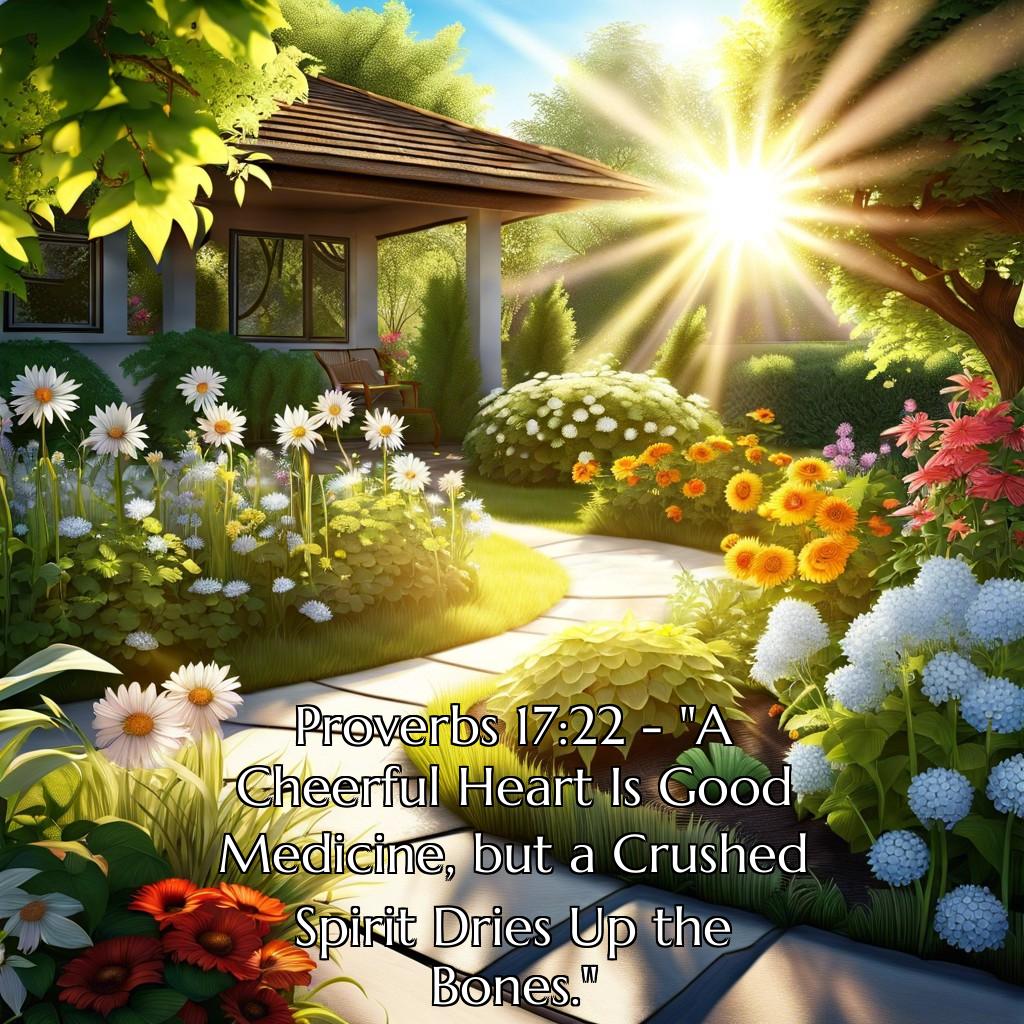In this article, you will find and understand the meanings of key Bible verses about joy.
Discovering joy in the pages of the Bible can transform both your day and life. These verses illuminate the path to lasting happiness, grounded in faith and divine promises. Dive in to understand how joy can become an integral part of your spiritual journey, buoyed by the wisdom of timeless scripture.
Psalm 118:24 – “This Is the Day That the Lord Has Made; Let Us Rejoice and Be Glad in It.”

Each day is a gift from the Lord. Embracing this mindset reshapes our outlook on life.
Joy isn’t just a fleeting emotion but a conscious choice to recognize God’s work in our lives.
This verse encourages a gratitude that can transform mundane moments into opportunities for celebration.
Rejoicing and being glad is an act of faith, acknowledging that God’s hand orchestrates our days.
Seeing each day as an intentional creation by God can inspire us to find joy even in challenging circumstances.
Nehemiah 8:10 – “Do Not Grieve, for the Joy of the Lord Is Your Strength.”

Nehemiah 8:10 offers a profound yet simple message. It encourages believers not to grieve, as joy found in the Lord provides strength.
Firstly, this verse highlights joy as a powerful source of resilience. Rather than deriving strength from physical or material means, it centers on a divine joy.
Secondly, it contrasts joy with grief. While grief can sap energy and motivation, the joy of the Lord replenishes and uplifts.
Lastly, this verse emphasizes communal worship and collective strength. In the context of Nehemiah, the Israelites gathered to hear the Law and were reminded of God’s unwavering support and love.
Embracing this joy leads to inner strength, which is essential for overcoming life’s challenges.
Philippians 4:4 – “Rejoice in the Lord Always. I Will Say It Again: Rejoice!”

Joy is a recurring theme in the Bible, and Paul emphasizes it powerfully in his letter to the Philippians. Here are some points to consider:
First, Paul is writing this while imprisoned, showing that joy transcends circumstances. His encouragement to “rejoice” under these conditions underscores that Christian joy isn’t dependent on external factors.
Second, the repeated command to rejoice highlights its importance in the Christian life. Joy is not optional but a vital aspect of worship and trust in God.
Third, this joy is anchored “in the Lord.” It emphasizes the relationship believers have with God, a joy derived from knowing Him and His promises.
Lastly, by urging believers to rejoice “always,” it shows that joy should be a constant attitude. This consistent joy reflects faith in God’s sovereignty and goodness.
In essence, this verse reminds believers to find their joy in their relationship with God, regardless of what life throws their way.
Romans 15:13 – “May the God of Hope Fill You With All Joy and Peace As You Trust in Him, So That You May Overflow With Hope By the Power of the Holy Spirit.”

Paul’s prayer in this verse is a beautiful blessing for believers. It encapsulates key elements of a joyful Christian life, rooted in trust and empowered by the Holy Spirit.
Trusting in God is foundational. Our faith in Him opens the door to experiencing true joy and peace. These aren’t fleeting emotions but deep-seated states of being, derived from our relationship with God.
The idea of being filled suggests abundance. It’s not just a trickle of joy and peace; it’s a full measure, sufficient to sustain us through life’s challenges.
Overflowing with hope means that our lives can reflect God’s promises. This hope isn’t passive; it’s active and vibrant because it comes from the power of the Holy Spirit working within us.
This verse encourages us to seek a deeper trust in God, allowing His joy and peace to permeate our lives and spill over to those around us.
John 15:11 – “I Have Told You This So That My Joy May Be in You and That Your Joy May Be Complete.”

Jesus’ words in this verse bring a profound promise of joy to believers. His joy is meant to be within us, filling our lives completely.
First, Jesus speaks of a divine joy, not based on temporary circumstances but on an eternal connection with Him. This joy transcends worldly happiness.
Secondly, it’s complete joy. Unlike fleeting moments of human pleasure, Jesus promises a fulfilling and sustaining joy that endures through trials and triumphs alike.
Lastly, this joy is shared. Jesus desires that His joy becomes our own, creating a bond of spiritual and emotional unity between Him and us.
This verse reminds us that true joy comes from a deep, abiding relationship with Jesus, enriching our lives in ways nothing else can.
James 1:2 – “Consider It Pure Joy, My Brothers and Sisters, Whenever You Face Trials of Many Kinds.”

This verse challenges us to see trials differently. Instead of viewing difficulties as merely obstacles, we’re encouraged to see them as opportunities for joy.
Firstly, trials test our faith and help it grow stronger. Just like muscles strengthen through resistance, our faith solidifies under pressure.
Secondly, enduring trials builds perseverance. This perseverance is essential for spiritual maturity, preparing us for greater challenges and deeper trust in God.
Lastly, facing difficulties with joy shifts our focus from the problem to the lesson. It transforms our mindset, helping us to trust in God’s greater plan and timing.
By embracing this perspective, we turn trials into blessings, seeing each challenge as a step closer to spiritual growth and deeper joy.
Psalm 16:11 – “You Make Known to Me the Path of Life; You Will Fill Me With Joy in Your Presence, With Eternal Pleasures At Your Right Hand.”

This verse beautifully encapsulates the essence of divine joy. Here are a few key points to unpack its meaning:
God as a Guide: This scripture assures us that God reveals the path of life, guiding us daily. His presence illuminates our journey.
Fulfillment in God’s Presence: Joy comes from being in God’s presence. It is an experience that surpasses temporary happiness, offering deep, lasting fulfillment.
Eternal Pleasures: Unlike fleeting earthly joys, the pleasures at God’s right hand are eternal, signifying perpetual contentment and divine satisfaction.
In essence, this verse teaches that true, boundless joy is found in a close, personal relationship with God, both now and forever.
1 Peter 1:8 – “Though You Have Not Seen Him, You Love Him; and Even Though You Do Not See Him Now, You Believe in Him and Are Filled With an Inexpressible and Glorious Joy.”

True joy transcends the physical and the visible. Faith plays a crucial role; loving Christ without having seen Him speaks to the power of belief. This verse emphasizes a joy that is “inexpressible and glorious,” highlighting its divine origin.
- This joy is rooted in faith and trust in Jesus.
- It contrasts worldly happiness, born from transient circumstances.
- Believing in Christ brings a unique, profound inner joy.
- Such joy is described as “glorious,” reflecting its divine quality.
This deep, spiritual joy remains, even amidst life’s challenges, showcasing the strength and persistence of faith.
Proverbs 17:22 – “A Cheerful Heart Is Good Medicine, but a Crushed Spirit Dries Up the Bones.”

A cheerful heart fosters health and vitality. This proverb highlights the powerful connection between emotional well-being and physical health. When joy fills our hearts, it acts like medicine, promoting overall wellness.
Conversely, a crushed spirit can lead to physical deterioration. Despair and sadness can weigh heavily on the body, manifesting as physical ailments.
- Here are some points to consider:
- A joyful attitude can boost the immune system.
- Laughter reduces stress hormones.
- Positive emotions can improve cardiovascular health.
- Cultivating joy can lead to better coping mechanisms in difficult times.
Maintaining a cheerful heart isn’t just good for the soul; it impacts our physical health profoundly.
Galatians 5:22 – “But the Fruit of the Spirit Is Love, Joy, Peace, Forbearance, Kindness, Goodness, Faithfulness.”

Joy, as a fruit of the Holy Spirit, signifies something deeper than mere happiness. Unlike fleeting emotions, it represents a settled state of contentment, rooted in faith and trust in God’s sovereignty.
Consider these points:
- This joy isn’t dependent on circumstances; it’s a constant presence because of the Holy Spirit within us.
- It complements other spiritual fruits, like love and peace, fostering a holistic sense of well-being.
- Manifesting this joy can positively influence those around us, spreading encouragement and hope.
Understanding joy as a spiritual fruit emphasizes its divine origin and steady nature. It’s a gift meant to sustain believers through all of life’s ups and downs.





